China's foreign minister on Wednesday hailed President Hu Jintao's Japanese tour for the Group of Eight Summit's outreach session, calling it a major diplomatic move which produces important achievements in many aspects.
President Hu, who arrived in Sapporo, capital of Hokkaido, late Monday, took part in over 20 activities during the past two days, Yang Jiechi said on his way home from Japan.
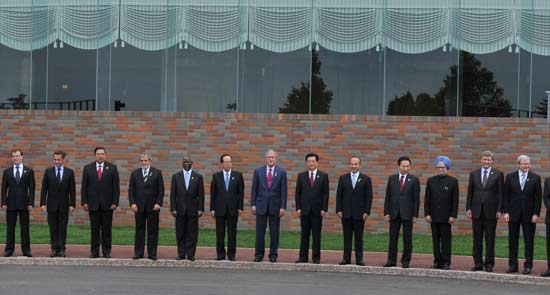
President Hu Jintao (6th R) poses with other leaders for the G8 leaders', Africa and International Organizations family photo at Toyako in Hokkaido, north Japan, on July 9, 2008.
ELABORATE STANCE, GUIDE COOPERATION
During the tour, Hu elaborated China's stance on key international issues and made important proposals which will guide international cooperation, Yang concluded.
Through the G8 outreach session in recent years, communications between the world's developed and developing countries have been conducted on key issues to coordinate stance and seek solutions to key issues, a move deemed conducive to the South-North cooperation and the settlement of global problems.
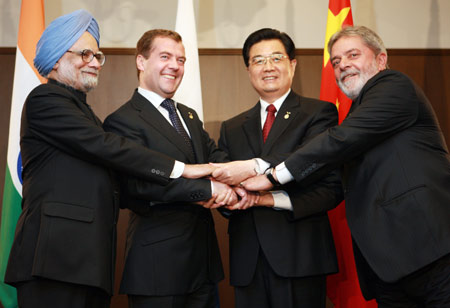
President Hu Jintao (2nd R), Russian President Dmitry Medvedev (2nd L), Indian Prime Minister Manmohan Singh (1st L) and Brazilian President Luiz Inacio Lula da Silva (1st R) pose for a photo as they meet at Toyako in Hokkaido, north Japan, on July 9, 2008.
This year's outreach session highlights the pressing issues like global economy, climate change, food and energy security -- issues not only confronted by the international community, but also China.
During the meeting, Hu proposed the building of a sustainable world economic system, an orderly international financial system, a just and reasonable international trade regime and a fair and effective global development mechanism.
This marked the first time that a Chinese leader has raised a set of comprehensive proposals on building the world's economic system, which reflects China's endeavor to push the economic globalization towards the direction of all-win situation and mutual benefits.
The proposals, echoed by many leaders during the meeting, also embody China's strategic consideration and strong sense of responsibility as the world's largest developing country, Yang said.
On the fight against climate change, Hu expounded China's relevant policies and its measures to deal with the problem.
Hu pointed out that climate change, an issue of development in essence, should be resolved within the framework of sustainable development and called on participating nations at the G8 summit and its outreach session to observe the principle of common but differentiated responsibilities and make constructive efforts to deal with climate change.
Hu described food security as an issue concerns not only every nation's national economy and popular well-being, but world's development and security.
China has made a major contribution to world's food security by feeding about one fifth of the world's population with only 9 percent of the world's arable land.
On energy security, Hu emphasized that China follows the general principle of self-sufficiency, while striving to implement the policy of energy exploitation and conservation simultaneously, improve energy diversity, raise energy efficiency, promote the development of renewable energy and set concrete goals for saving energy and cutting emissions.
PROMOTE SOUTH-SOUTH COOPERATION, SOUTH-NORTH DIALOG
Hu Jintao's visit has boosted coordination and cooperation among developing countries, and added new momentum to the South-South cooperation as well as North-South dialogue, the Chinese foreign minister said.
At a meeting of five major developing countries' leaders from China, India, Brazil, South Africa and Mexico, President Hu said developing countries should strengthen coordination and cooperation in a bid to jointly push forward the lofty ideals of peace and development for all humanity.
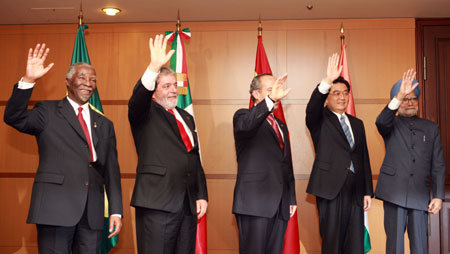
President Hu Jintao (2nd R) pose for photos with Indian Prime Minister Manmohan Singh (1st R), Mexican President Felipe Calderon (C), Brazilian President Luis Inacio Lula da Silva (2nd L) and South African President Thabo Mvuyelwa Mbeki before their meeting in Sapporo, northern Japan, July 8, 2008.
Hu also proposed priorities for further cooperation among the five countries.
The countries should strengthen solidarity and coordination, promote common development, increase economic exchanges and coordination, and carry out mutually beneficial cooperation, Hu suggested.
The countries should step up coordination and advance South-South cooperation, and push forward reforms in global systems of economy, finance, trade and development, Hu said.
Hu also called for a long-term view and the promotion of North-South dialogue, adding that the five nations should work together to shoulder responsibilities, and wield a positive influence on global affairs.
Hu's proposals won support and approval from the leaders of the other four countries, and were written into the declaration issued after the meeting of the five nations, Yang Jiechi said.
The proposals are expected to wield a positive influence on South-South cooperation and the North-South dialogue, Yang added.
CONDUCT BILATERAL MEETINGS
President Hu carried out high-level diplomacy during his visit to Japan, which helped boost a healthy and stable development of China's ties with other countries, Yang said.
During his stay, Hu met with over 10 foreign leaders, and reached a broad consensus with them on promoting bilateral ties and strengthening cooperation in various fields.
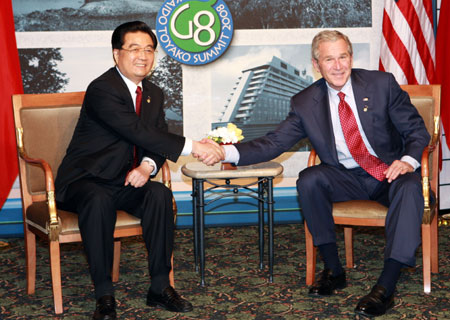
President Hu Jintao (L) meets with his U.S. counterpart George W. Bush in Toyako, northern Japan, July 9, 2008.
Hu and his U.S. counterpart George W. Bush agreed that the two countries will boost dialogue, exchanges and cooperation to ensure bilateral ties to develop in a healthy and stable way.
Hu and Russian President Dmitry Medvedev agreed the two countries will comprehensively promote cooperation in trade, economy and energy and the framework of the Shanghai Cooperation Organization.
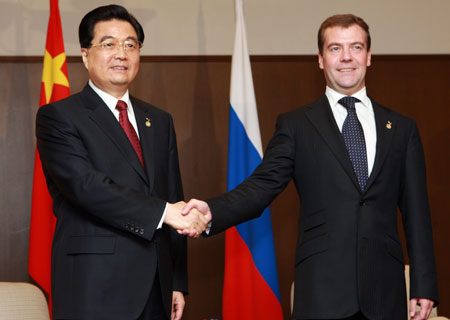
President Hu Jintao (L) meets with his Russian counterpart Dmitry Medvedev in Toyako, northern Japan, July 9, 2008.
During Hu's meeting with Japanese Prime Minister Yasuo Fukuda, the two leaders promised to maintain the sound development trend in bilateral ties, and jointly push forward the strategic and mutually beneficial relations.
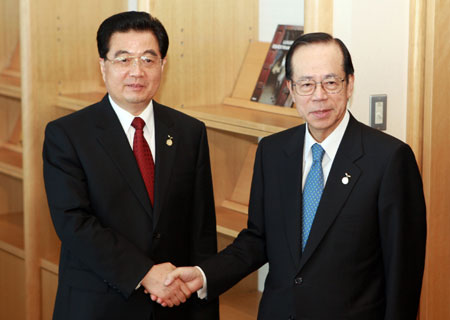
President Hu Jintao (L) meets with Japanese Prime Minister Yasuo Fukuda in Toyako, northern Japan, July 9, 2008.
President Hu and leaders of several major developing countries, including Brazilian President Luiz Inacio Lula da Silva, South African President Thabo Mbeki and Indian Prime Minister Manmohan Singh, agreed to strengthen friendly and mutually beneficial cooperation in bilateral ties and international affairs.
BUILD UNDERSTANDING, FRIENDSHIP, COOPERATION
Hu briefed other leaders China's domestic development and current priorities of work, a move to increase mutual understanding and promote friendship and cooperation, the Chinese foreign minister said.
On many occasions, President Hu referred to the progress made by the Chinese people and government in relief work following the devastating earthquake on May 12.
He also thanked the governments and people of other countries for their relief assistance and sympathies offered after the quake. Hu proposed international cooperation in natural disaster prevention and reduction, and share of experience in fighting natural disasters.
(Xinhua News Agency July 10, 2008)